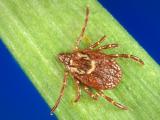For the first time, researchers describe the bacterial disease tularemia in dead stranded beluga whales, which they say could present a risk to other wildlife and people.
Writing in Emerging Infectious Diseases, a team led by researchers from Alaska Veterinary Pathology Services and the US Centers for Disease Control and Prevention report the 2023 discovery of the two diseased whales in Cook Inlet, Alaska.
In October of that year, a biologist contracted tularemia during a postmortem exam of a seal in Washington state. That same fall, the whales were found with lesions characteristic of tularemia, and the Alaska and CDC scientists used polymerase chain reaction (PCR) and immunohistochemistry to confirm the presence of Francisella tularensis (holarctica subspecies), a gram-negative bacterium that infects people and animals.
Phylogenetic analysis identified this strain in a clade identical to the case in Washington, as well as in other Northern Hemisphere isolates.
Both animals were pregnant adult females with swollen lymph nodes, inflammation of the membranes surrounding the lungs, pneumonia, and hepatitis. One animal had severe bruising of the blubber. PCR and bacterial cultures produced negative results.
Marine mammals could further spread pathogen
Tularemia is spread via tick bites or through the skin, ingestion, or inhalation. In people, tularemia typically causes flu-like illness, with swollen lymph nodes, conjunctivitis, pneumonia, and septicemia, as well as exposure-route–specific symptoms.
F tularensis was first recorded in Alaska in 1938. Since then, it has occasionally been found in ticks, rabbits and hares, and rodents. Serologic studies have identified exposure in people, birds, land mammals, and polar bears in different areas of the state.
Our findings highlight a new risk to persons working in the marine environment and should be considered when assessing biosecurity and marine mammal health in the North Pacific.
While Cook Inlet beluga whales are vulnerable to a variety of bacterial pathogens, this was the first detection of F tularensis in whales, the authors said.
"The pattern of pathology represents the pulmonary form of tularemia, and the route of exposure was likely inhalation of contaminated water," they wrote. "F tularensis is primarily a disease associated with freshwater, but the brackish nature of Cook Inlet and nearshore residence of belugas expose them to potentially contaminated freshwater runoff as well as to other reservoirs typically associated with freshwater (e.g., aquatic rodents, mosquito larvae)."
Host factors such as a weakened immune system or environmental changes such as increased runoff may have been involved, the researchers said.
"The propensity of whales to travel long distances could further disseminate this pathogen, increasing exposure to humans and wildlife," they concluded. "Our findings highlight a new risk to persons working in the marine environment and should be considered when assessing biosecurity and marine mammal health in the North Pacific."














